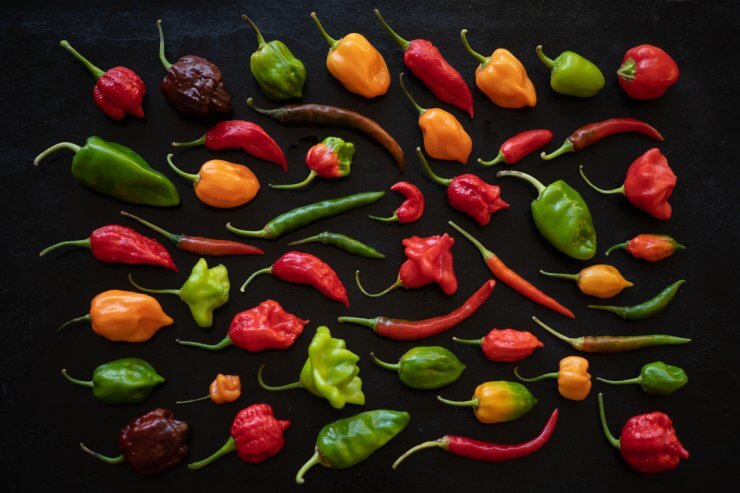
Multiple varieties of hot peppers

Multiple varieties of hot peppers
Chile peppers are packed with vitamins (especially vitamin C), minerals, and disease-fighting compounds. Rich in antioxidants, chile peppers can protect your heart, lower your blood pressure, and help control blood sugar. The vitamin C in chile peppers helps boost your immune system and neutralize free radicals in your body. And since your body can’t store vitamin C, you need to be sure to get your daily requirement. Chile peppers pack a lot of nutritious punch into just a few tasty calories.
Here are some of the other ways chile peppers contribute to good health.
Antioxidant Engine
Chile peppers get their heat from compounds called capsaicinoids; that spiciness that makes your eyes water. The capsaicinoid compounds are also antioxidants, fighting off free radicals in the body and providing some measure of protection against infection and the development of some types of cancer.
Capsaicinoids are just one of seven beneficial antioxidants found in chile peppers. While they’re the most famous, hot peppers also contain capsanthin, violaxanthin, lutein, zeaxanthin, sinapic acid, and ferulic acid. The antioxidant levels in chile peppers increases as the peppers ripen.
Blood Pressure
The capsaicin in hot peppers has analgesic (pain-reducing) and anti-inflammatory properties — both of which can contribute to better heart health. Studies show that capsaicinoids improve the circulation of blood in the heart, increase blood flow to tissues, reduce plaque buildup in blood vessels, reduce the body’s absorption of fat and cholesterol, and lower your blood pressure.
Digestive Health
Let’s dispel one rumor right now: eating spicy foods, including foods made with hot peppers, will not give you an ulcer. In fact, the antioxidants in chile peppers may actually help heal some intestinal issues while also promoting gut health. Studies indicate that capsaicin may help provide some protection for the stomach and intestines.
Brain Health
Studies have shown that compounds called phenolic acids — especially a compound called p-Coumaric acid— may contribute to better brain health by helping protect against mental decline.
Eye Health
Chile peppers contain lutein, a nutrient that helps protect your eyes against damage to your photoreceptors because of light exposure. A diet rich in lutein may also help reduce the risk of macular degeneration, a condition that can cause vision loss.
Skin Health
The ferulic acid in chile peppers contains antioxidants that can help slow the skin’s aging process by reducing the damage free radicals cause to the skin.
Healthy Weight
Eating spicy food may give a whole new meaning to burning calories. One study shows that chile peppers contain compounds that increase heat production and fat metabolism. Capsaicin, the most well-known compound in chile peppers, may help with weight loss.
Pain Relief
It’s important to protect your skin, eyes, and mucous membranes when you’re handling raw hot peppers that rate high on the Scoville scale. But the capsaicin that can cause such agony (even burns!) from accidental contact can also provide pain relief when prepared and applied appropriately. Capsaicin-infused skin patches and cream can help relieve the discomfort of pulled muscles, arthritis, and fibromyalgia.
Spice of Life?
Eating spicy peppers might help you live longer. Researchers followed almost half a million people for years. The study indicated that people who ate spicy food once or twice a week had a 10% reduction in total mortality. Those who ate spicy food more frequently appeared to increase their chances of longevity even more.
Did you know that hot peppers are so healthful? Please tell us your biggest reason for growing and eating hot peppers.



